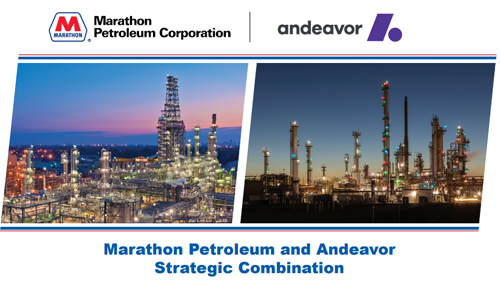
Marathon Petroleum Corp. agreed to buy rival Andeavor for $23.3 billion in the biggest-ever deal for an oil refiner that would create the largest independent fuel maker in the U.S.
The
offer, payable in either cash or shares, values Andeavor at about
$152.27 a share, the companies said in a statement Monday. That
represents a 24 percent premium over Friday’s closing price.
Marathon shares
sank as much as 8.9 percent in early trading with analysts at RBC
Capital Markets seeing the deal done at “peak refining bullishness.”
Andeavor rose as much as 18 percent. Shares of Andeavor, Marathon and other independent refiners have soared to record highs this year.
Growing fuel demand, both in the U.S. and Latin America, and a
shale boom that’s expanded access to relatively inexpensive domestic
supply have given American refiners a leg up against foreign
competitors.
“Why
wouldn’t you do this deal?” Greg Goff, Andeavor’s chief executive
officer, said on a conference call Monday. “The time is right now,
because for this industry, the wind is behind our backs.”
Passing Valero
Marathon
is focused in the Midwest and Gulf Coast, while Andeavor concentrates
on the western U.S., including refineries and pipelines it acquired in
last year’s merger with Western Refining Inc. The combination, which
will use the name Marathon, would overtake Valero Energy Corp.
as the biggest in U.S.-based oil refiner by capacity, generating about
16 percent of the nation’s total, according to Bloomberg calculations.
“Wow!”
Matthew Blair, director of refining research at Tudor Pickering Holt
& Co., wrote in a report. Blair called Andeavor a “big winner” in a
deal that is “extremely positive.” As for Marathon, meshing the two
giant companies will be key, Blair said, adding that regulatory problems
should be minimal, “given the disparate geographical markets of each
company.”
The
companies said they expect annual cost and operating synergies of about
$1 billion within the first three years. Given projected cash-flow
generation, Marathon’s board also approved share buybacks of $5 billion.
Gary Heminger, Marathon’s CEO, will be chief executive. Goff will
become executive vice chairman.
The boards of both companies unanimously approved the deal,
which is expected to close in the second half of this year, subject to
regulatory and shareholder approvals.
Passing Phillips
Marathon’s shares were down 6.8 percent to $75.88 as of 12:17 p.m. in New York, while Andeavor jumped 13 percent to $138.72.
Findlay, Ohio-based Marathon is the third-largest
U.S. refiner by market capitalization, valued at about $38.6 billion,
according to data compiled by Bloomberg. Last year the company sold 5.8
billion gallons of fuel through its Speedway convenience store chain.
The combined company would pass Phillips 66, valued at $51.9 billion, as the largest U.S. independent refiner by market capitalization.
San
Antonio, Texas-based Andeavor, formerly known as Tesoro Corp., is the
fourth-largest, worth $18.7 billion. The company’s assets also include 5,300 miles of pipelines and 40 marine, rail and storage terminals.
Last week, Andeavor announced two joint ventures to move crude oil from West Texas to the Gulf Coast.
Permian Access
The
first venture, a pipeline project majority owned by Phillips 66, would
haul as many as 700,000 barrels per day of crude from the Permian Basin
to the Corpus Christi, Sweeny and Freeport area. The second is a stake
in a new marine terminal under development by Buckeye Partners LP that
would connect with the pipeline.
Marathon’s Galveston Bay
refinery, which currently buys about 200,000 barrels a day of light
domestic oil, could benefit from the pipeline connectivity, Heminger
said in a conference call Monday.
Marathon’s natural gas
processing capacity will also increase by about 20 percent under the
deal, to more than 10 billion cubic feet per day.
The combined
entity expects to be well-positioned to capitalize from upcoming
regulations to reduce pollution from ships. Andeavor’s port assets in
California, coupled with Marathon’s in the U.S. Gulf Coast, will give
the combined company the ability to sell lower-sulfur ship fuel.
“Ports are the lifeblood to refining out in those markets,” Heminger said Monday.
— With assistance by Naureen S Malik, and Dan Murtaugh
No comments:
Post a Comment